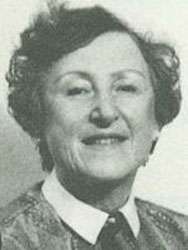Dinora Pines
Dinora Pines Lewison (30 December 1918 – 26 February 2002), known by her maiden name Dinora Pines, was a Russian born, British physician and psychoanalyst, who had specific interests in women's psychology and psychosomatic illness.[1][2]
Dinora Pines | |
|---|---|
 | |
| Born | 30 December 1918 |
| Died | 26 February 2002 (aged 83) |
| Nationality | Russian British |
| Education | London. The Sorbonne. |
| Occupation | physician and psychoanalyst |
| Spouse(s) | Anthony Lewison |
| Children | Kim Lewison |
Life
Pines was born in Lutsk, now in Ukraine, but then in Russia in 1918. Her family moved to Antwerp and her father who was a surgeon was given a medal by the King of Belgium. Later her father moved to London and despite his qualifications he had to work as an ordinary doctor. Her first degree was in languages at University College London. Qualified in four languages she went to the Sorbonne but returned to England as war broke out.[3]
Between 1940 and 1945 she retrained as a physician and at the same time she lost family members in the holocaust in Europe. Pines married Anthony Lewison after the war and had two sons. She also worked after the war taking some interest in dermatology and working at the Elizabeth Garrett Anderson hospital and the South London Hospital for Women and Children[3]
Her interest and lack of success at dermatology led her to experiment with an emotional approach to reducing skin problems. She met Hilda Abraham and this led her to an interest in psychology. She enrolled at the Hampstead Child Therapy Course and Clinic in 1959 and she became a qualified psychoanalyst in 1965. She then went into private practice. She had interests in women's psychology and psychosomatic illness.[1]
Pines was able to donate material to Karl Abraham's biography. He had analysed his daughter, Hilda, when she was six noting details of her reaction to enemas and masturbation. Hilda died in 1971 and as the analysis had been passed to Pines she was able to add it to the record of Karl Abraham's work in 1974.[4]
Selected works
- Pines, Dinora (December 1972). "Pregnancy and motherhood: interaction between fantasy and reality". British Journal of Medical Psychology. 45 (4): 333–343. PMID 4680578.
- Pines, Dinora (February 1980). "Skin communication: Early skin disorders and their effect on transference and countertransference". The International Journal of Psychoanalysis. 61 (3): 315–23. PMID 7440071.
- Pines, Dinora (1982). "The relevance of early psychic development to pregnancy and abortion". The International Journal of Psychoanalysis. 63 (3): 311–9. PMID 7129777.
- Pines, Dinora (1986). "Working with women survivors of the Holocaust: affective experiences in transference and countertransference". The International Journal of Psychoanalysis. 67 (3): 295–307. PMID 3744688.
- Pines, Dinora (1990). "Emotional aspects of infertility and its remedies". The International Journal of Psychoanalysis. 71 (4): 561–68. PMID 2074144.
- Pines, Dinora (1990). "Pregnancy, miscarriage and abortion: a psychoanalytic perspective". The International Journal of Psychoanalysis. 71 (2): 301–07. PMID 2365549.
- Pines, Dinora (1994). A woman's unconscious use of her body. New Haven: Yale University Press. ISBN 978-0300059601.
- Pines, Dinora (1997). Der weibliche Körper: eine psychoanalytische Perspektive (in German). Stuttgart: Klett-Cotta. ISBN 978-3608916652.
References
- Schachter, Joan (2015). "Dinora Pines". The Institute of Psychoanalysis. British Psychoanalytical Society. Retrieved 17 April 2017.
- "Women Psychoanalysts in Great Britain - Dinora Pines (1918-2002)". Psychoanalytikerinnen. Biografisches Lexikon. 23 March 2017. Retrieved 4 April 2017.
- Johns, Jennifer (8 March 2002). "Dinora Pines". The Guardian. Retrieved 17 April 2017.
- the late Pierre Geissmann; Claudine Geissmann (10 November 2005). A History of Child Psychoanalysis. Routledge. pp. 28–29. ISBN 978-1-134-83003-9.